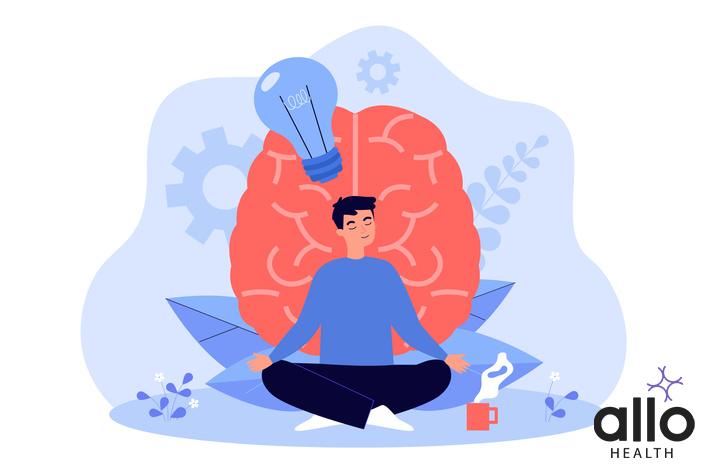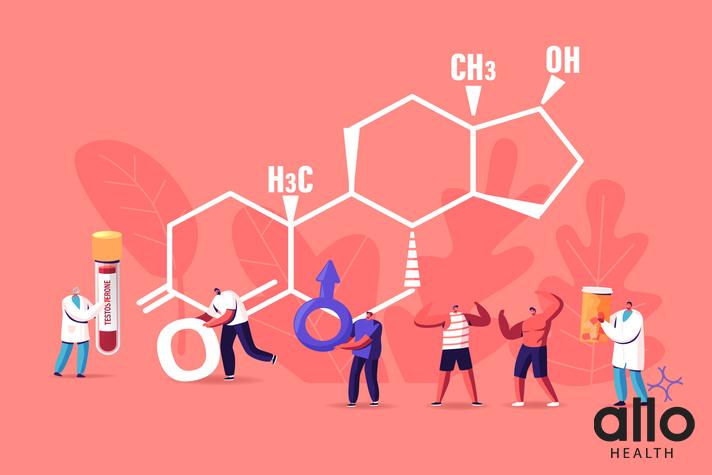Is Masturbating 3 Times a Day Healthy?

"The following blog article provides general information and insights on various topics. However, it is important to note that the information presented is not intended as professional advice in any specific field or area. The content of this blog is for general educational and informational purposes only.
Book consultation
The content should not be interpreted as endorsement, recommendation, or guarantee of any product, service, or information mentioned. Readers are solely responsible for the decisions and actions they take based on the information provided in this blog. It is essential to exercise individual judgment, critical thinking, and personal responsibility when applying or implementing any information or suggestions discussed in the blog."
In contemporary discourse, the topic of masturbation and its effects on health remains both intriguing and contentious. Amidst the varied opinions, the question arises: Is masturbating three times a day conducive to one’s well-being? This inquiry delves into the scientific understanding of masturbation’s impact on physical and mental health. By examining existing research and expert insights, we aim to elucidate the potential benefits and risks associated with such frequency. Through an evidence-based exploration, this article endeavors to provide clarity on a subject often shrouded in myth and misconception, ultimately empowering individuals to make informed decisions regarding their sexual health.
What is Masturbation?
Masturbation is the act of sexually stimulating oneself, typically by touching own genitals. It is a natural and common aspect of human sexuality, practiced by people of all genders and sexual orientations. While often a solitary activity, it can also be incorporated into sexual relationships as a form of mutual pleasure or sexual intimacy.
Masturbation offers individuals an opportunity to explore their bodies, understand their sexual responses, and relieve the created sexual tension. It is widely considered a safe and healthy form of sexual expression, free from the risks associated with unprotected sexual intercourse, and can contribute to overall sexual well-being. And not in males, masturbation in females is also good.
Masturbation is a variant of sexual expression and has no known causal relation
with sexual disorders. Literature is still scarce in studies addressing particularities
of female masturbation and its associations. This study aimed to investigate female masturbation in a Brazilian sample. The objectives were also to analyze the associations and correlations between masturbation and different variables,
including body image.
Understanding the Science Behind Masturbation

- Masturbation has been shown to release endorphins, dopamine, and oxytocin, which are natural stress relievers.
- Research suggests that regular masturbation can reduce cortisol levels, the hormone associated with stress.
- Masturbation can promote relaxation and improve mood by triggering the release of tension and promoting a sense of well-being.
- It can also help individuals sleep better, as it induces feelings of relaxation and can serve as a natural sleep aid.
- Engaging in solo sexual activity can provide a healthy outlet for stress relief without the potential risks associated with other coping mechanisms.
Medical and Psychological Effects of Masturbation
Medical Effects:
- Masturbation can help relieve stress by releasing endorphins, reducing cortisol levels.
- It may improve immune function by increasing levels of cortisol.
- Daily masturbation may decrease the risk of prostate cancer by flushing out toxins.
Psychological Effects:
- Masturbation can promote a sense of self-discovery and body awareness.
- It can serve as a healthy outlet for sexual desires, reducing the likelihood of risky behavior.
- Masturbation can enhance mood by triggering the release of dopamine during sex, promoting feelings of pleasure and relaxation.
- It can also aid in better sleep as it helps to relax the body and mind.
- Masturbation can contribute to a positive body image by fostering self-acceptance and confidence.
Overall, while cultural attitudes towards masturbation vary, understanding its medical and psychological effects from expert advice can help individuals make informed decisions about their sexual health and well-being. But for any feelings about masturbation talking to a qualified health provider can be helpful.
Hormones Releases During Masturbation

Engaging in masturbation triggers the release of several hormones in the body, including:
- Dopamine: Known as one of the “happiness hormones,” dopamine is associated with the brain’s reward system.
- Endorphins: These natural pain relievers also have stress-reducing and mood-enhancing effects.
- Oxytocin: Often referred to as the love hormone, oxytocin is linked to social bonding.
- Testosterone: Released during sexual activity to enhance stamina and arousal, as evidenced by a 2011 study.
- Prolactin: Primarily involved in lactation, prolactin also affects mood and the immune system.
The act of masturbating can lead to the release of healthy levels of these hormones, contributing to improved mood and physical well-being.
What Happens to Your Body When You Masturbate?

- Masturbation induces physical and mental changes, including increased blood flow to the pelvic area.
- The release of feel-good hormones like dopamine and endorphins provides stress relief.
- Loneliness or boredom may influence the frequency of masturbation.
- Excessive masturbation can lead to health complications such as decreased sperm count and erectile dysfunction in men.
- Women may experience clitoral hypersensitivity and difficulty reaching orgasm with excessive masturbation.
- Frequent masturbation may result in genital sores, bleeding, and infections.
- Masturbation contributes positively to sexual health by facilitating self-discovery and enhancing sexual experiences with a partner.
- It can improve pelvic floor muscle strength, leading to stronger orgasms and better bladder control.
- There’s no standard frequency for masturbation; it varies among individuals.
- As long as it doesn’t interfere with daily life or cause physical discomfort, there’s no need for shame or guilt.
Can Masturbating Too Much Be Harmful to Your Health?
Excessive masturbation may lead to physical, emotional, and psychological concerns such as skin irritation, genital injuries, fatigue, and decreased libido.
- Hypersexuality or compulsive masturbation can result in loneliness, anxiety, sexual dysfunction, and erectile dysfunction.
- Moderation is essential for maintaining a healthy sexual drive, whether alone or with a partner.
- Masturbation can provide health benefits like stress reduction, improved sleep, mood enhancement, and a better understanding of one’s body.
- There’s no universal limit on how often one should masturbate; it varies per individual. Seek professional help if masturbation habits interfere with daily life or cause distress.
How Masturbation Affects Your Sexual Performance?

- Masturbation fosters self-awareness of one’s body and sexual preferences.
- It aids in building confidence and exploring sexual fantasies.
- Helps in understanding pleasure points, facilitating better communication during sex.
- Excessive masturbation may lead to decreased libido and erectile dysfunction.
- Masturbating excessively can decrease natural lubrication, causing discomfort during intercourse.
- Moderation is crucial for maintaining healthy sexual performance.
- Masturbation can alleviate stress and enhance sleep quality in your everyday life.
- It triggers the release of endorphins, promoting relaxation and reducing stress levels.
- However, excessive masturbation may lead to addiction and interfere with daily life.
- Seeking opinions from doctors is advisable if masturbation affects work or social life significantly.
Tips for Maintaining Healthy Masturbation Habits
Achieving a healthy balance with masturbation can be challenging.
- If excessive masturbation causes harm, consider setting clear limits on frequency.
- Finding stress management alternatives like meditation or exercise.
- Engaging in non-sexual activities you enjoy.
- Masturbation offers benefits like stress relief and improved sleep.
- Maintain balance to avoid interference with daily life or relationships.
- Practice safe and hygienic habits, including handwashing and lubrication.
Remember, masturbation is a personal choice; prioritize what works best for you. Seeking professional help for compulsive behavior.
Exploring Different Types of Masturbation Techniques
Masturbation is a natural and healthy aspect of human sexuality, and exploring various techniques can enhance pleasure and self-awareness.
- Hand stimulation remains the most common method, allowing for experimentation with pressure, speed, and motion.
- Incorporating sex toys such as vibrators or dildos can offer different sensations and intensify arousal.
- Experimenting with different positions, such as lying down, sitting, or standing, can vary stimulation and enhance comfort.
- Trying new fantasies, erotica, or visual aids can stimulate the imagination and add excitement.
- Mutual masturbation with a partner can deepen intimacy and provide opportunities for shared exploration.
When to Seek Professional Help for Compulsive Masturbation?
- Persistent Urges: If the desire to masturbate interferes with daily activities and persists despite efforts to control it.
- Negative Impact: When compulsive masturbation affects relationships, work, or personal well-being negatively.
- Failed Attempts: Inability to reduce or stop compulsive behavior despite multiple attempts.
- Emotional Distress: Feelings of guilt, shame, or anxiety surrounding masturbation habits.
- Physical Harm: Any physical injuries or harm caused due to excessive lengthy masturbation.
- Difficulty Functioning: When it becomes challenging to function normally without masturbating excessively.
Conclusion
In conclusion, the frequency of masturbation and its potential effects on health is a topic of ongoing debate among experts. While some argue that moderate masturbation can have benefits for sexual health and stress relief, excessive indulgence may lead to negative consequences such as physical discomfort or disruption of daily activities. Individuals must maintain a balanced approach to self-pleasure, considering their bodily responses and overall well-being.
Most Asked Questions
-
Is masturbating three times a day healthy?
The frequency of masturbation varies for individuals, and what may be healthy for one person may not be for another. It's essential to consider factors such as physical and mental well-being, personal beliefs, and lifestyle choices.
-
Can masturbating excessively lead to health issues?
Excessive masturbation can potentially lead to issues such as chafing, soreness, or decreased sensitivity, but it's crucial to emphasize that moderation is key. Consulting with a healthcare professional can provide personalized advice.
-
Is there an ideal frequency for masturbation?
There isn't a one-size-fits-all answer to this question. What matters most is ensuring that masturbation is done in a way that feels comfortable and enjoyable, without interfering with daily life or causing distress.
-
Are there any benefits to masturbating?
Masturbation can offer various benefits, including stress relief, improved mood, and increased self-awareness of one's body and pleasure preferences.
-
How can one determine a healthy balance regarding masturbation?
It's essential to listen to one's body and emotional state. If masturbation starts to interfere with daily activities, and relationships or causes physical discomfort, it may be a sign to adjust frequency and seek professional guidance if necessary.







































